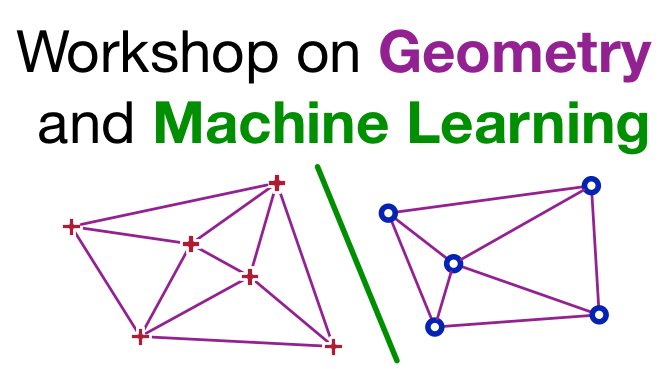
 8th Workshop on Geometry and Machine Learning
8th Workshop on Geometry and Machine Learning
| 16:00-16:20 | Hubert Wagner (University of Florida) | Quantifying Geometric-Topological Interactions using Mixup Barcodes
with Nickolas Arustamyan, Matthew Wheeler, and Peter Bubenik |
| 16:20-16:40 | Jan Hula (CIIRC and University of Ostrava) | Do Language Models See a Space?
with Jiri Janecek, David Mojzisek, and Mikolas Janota |
| 16:45-17:05 | Bala Krishnamoorthy (Washington State University) | Box Filtration
with Enrique Alvarado and Prashant Gupta |
| 17:05-17:25 | Iolo Jones (Durham University) | Diffusion Geometry for Machine Learning |
| 17:45 - 18:35 | Dimitrios Gunopulos (University of Athens) | Learning from Data with Geometric Properties |
 |
Bio: Dimitrios Gunopulos got his PhD from Princeton University in 1995. He is currently a Professor and the Department Chair in the Department of Informatics and Telecommunications, University of Athens. He was a Postdoctoral Fellow at the Max-Planck-Institut for Informatics, a Researcher at the IBM Almaden Research Center, a Visiting Researcher at the University of Helsinki, a Professor at the Department of Computer Science and Engineering in the University of California Riverside, and a Visiting Researcher at Microsoft Research, Silicon Valley Lab. His research is in the areas of Fairness and Explainability in AI, Data Mining of Spatiotemporal Data, Database Indexing, Machine Learning, Peer-to-Peer systems, and Geometric Algorithms. He has co-authored over a hundred journal and conference papers, seven patents, and a book. He is the recipient of the 2020 IEEE ICDM Outstanding Service Award. His Erdos number is 2. His research has been supported by NSF (including an NSF CAREER award), the DoD, the Institute of Museum and Library Services, the European Commission, the Greek General Secretatiat of Research and Technology, AT&T, Nokia, a 2015 Yahoo Faculty Award and a 2017 Google Faculty Award. He has served as General co-Chair in SDM SIAM 2018, SDM SIAM 2017, HDMS 2011, and IEEE ICDM 2010, and as PC co-Chair in ACM SIGKDD 2023, IEEE ICDE 2020, ECML/PKDD 2011, IEEE ICDM 2008, ACM SIGKDD 2006, SSDBM 2003, and DMKD 2000. | In several data mining or machine learning learning problems and applications we aim to learn from data that have geometric properties. A typical, widely encountered such example is analyzing and learning from user mobility data. Mobility data are being collected today at unprecedented rates and used in diverse learning problems, from route planning to traffic management. Focusing on the real-time analysis of GPS trajectory data we present recent advances and highlight research challenges in the problems of map building, travel time estimation, and multi-objective routing. |
| 18:35-18:55 | Lori Ziegelmeier (Macalester College) | The Survival Analysis of Topological Features of Knowledge Networks
with Russell J. Funk, Jingyi Guan, Jason Owen-Smith, and Adam Schroeder |
| 18:55-19:15 | Alexander Munteanu (TU Dortmund) | Improved learning via k-DTW: a novel dissimilarity measure for curves
with Amer Krivosija, Andre Nusser, and Chris Schwiegelshohn |